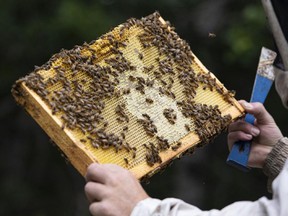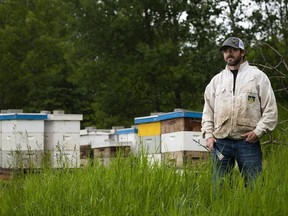Feeding the World
"I've not heard of other places where there's been a pollination shortfall.""Beekeepers are having more problems maintaining their colonies and there's more demand for their colonies for pollination."Robert Paxton, zoology head, Martin Luther University Halle-Wittenberg, Germany"We've built this dependency on managed pollinators, specifically honeybees.""We've created this demand for commercial pollinators that we move around in pollination units.""That's pretty far from the natural environment where a honeybee could thrive."Maggie Shanahan, bee-keeper, researcher, Spivak Laboratory, University of Minnesota
 |
When berry crops go into flowering, berry farmers are no longer reliant on the timely arrival of bees to pollinate the flowers so berries will be produced. What was once a routine natural occurrence has been imperilled by a global die-off of bees. Some are presumed to have died as a result of the use of pesticides, of loss of habitat, of naturally-occurring disease afflicting bees. And nor have bees belonging to hives maintained by bee-keepers for honey production been spared.
"We probably haven't seen this high of losses since one of our early years to bee-keeping. I know some guys that lost 90 percent [of their hived bees]", said Kevin Nixon, in the business for close to three decades. Of the 10,000 hives he manages near Red Deer, Alberta, he has lost 40 percent. Across the entire country growers of blueberries face problems relating to a shortage of commercial hives they've become reliant on for the production of Canada's most valuable fruit crop.
In Canada, bee-keepers on average have lost half their colonies this year. Massive honeybee deaths have been reported worldwide by bee-keepers in the last several years. Canada is seeing catastrophic levels of bee hive losses. Its $274-million blueberry market makes it the world's seventh-largest exporter. But the fragile pollination industry, facing a breakdown, is threatening that export crop.
There has been a boom in acreage devoted to fruit and vegetables throughout North America, even as the number of wild bees have diminished. Where once bee-keepers struggled to earn a living selling honey, they began renting out hives to farmers needing to boost their yields. This led to "pollination brokers" connecting growers with hives, an industry criss-crossing the continent on semi-trucks reaching destinations.
 |
| Beekeeper Kevin Nixon with some of his hives. Photo by Gavin John/Bloomberg |
Bees' critical role in pollination of flowering plants to trigger reproduction benefits the world with nutritious and colourful foods like apples, cherries, melons and almonds. Over 100 crops in the United States are reliant on pollinators The added revenue brought to crop production is valued at $18 billion on an annual basis, according to the U.S.Department of Agriculture.
The very fact that bees have been overworked has helped to create the crisis in pollination. "The paradigm of bringing in honeybees is at a breaking point. Bees are not getting better; they are slowly getting worse", commented Mark Winston, a leading expert in bees and their pollinating role in agriculture.
In 2005, wholesale death rates in the United States among honeybee colonies were alarming, a phenomenon occurring in other countries as well, attributed to issues from extreme weather and chemical exposure, to parasites. Typically, bee-keepers in the U.S. lose on average 40 percent of their bees annually; losses in Canada on the other hand, average about 20 percent.
Studies suggest the number of managed honeybees rose over 80 percent since the early 1950s in tandem with beekeepers expanding to match rising demands of agriculture. In Canada, about 400,000 colonies of bees were lost this year, with few replacement options according to the Canadian Honey Council. Canada has sourced 85 percent of its imports of honeybees from New Zealand. A two-pound package of bees holds about 8,000 bees. Australia and Chile provide the remainder of Canada's bee imports.
 |
| Jason Smith is chair of the British Columbia Blueberry Council, which is the country’s largest blueberry producing province. Photo by Jennifer Gauthier/Bloomberg |
Labels: Agriculture, Bee-Keeping, Berry Crops, Pollinators

0 Comments:
Post a Comment
<< Home